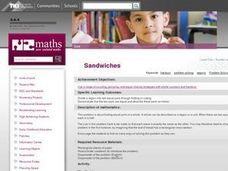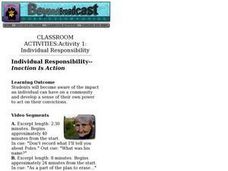Curated OER
Legs in the Barn
Pupils listen to the problem being read. They then brainstorm possible approaches and are encouraged to plan ways of recording their work so that others examine what they have done and share their findings.
Curated OER
Sandwiches
Young scholars are introduced to the problem by thinking of all the ways 2 of their classmates could share a peanut butter sandwich. In pairs, students work describing their ideas. They then keep a record of all the different ways they...
Curated OER
Playing With Probability
Sixth graders investigate probability. They use ratios to solve simple probability situations. Students express their solutions in the form of fractions or decimals. They predict outcomes and complete probability worksheets.
Curated OER
Mathematics Within: Shape, Space & Measurement
Students experiment and analyze triangulation to assess degrees of combined angles, predict polygons that tessellate as well as extending of shapes to create tessellations. They explore the concept of why some polygons tessellate when...
Curated OER
But That's Not FAIR!
Third graders solve problems using fractions through hands-on activities and appropriate literature.
Curated OER
Change & Conservation of City Landscape
Seventh graders participate in fieldwork by observing and photographing buildings.
Curated OER
PECKING OUT RATIOS
The student will practice writing ratios as fractions, using poultry-related illustrations as visual representations of the problems.1. Review the definition of a ratio and how to write ratios as fractions. If possible, use
groups of...
Curated OER
Flip a Coin
Students are introduced to the concept of probability. In groups, they make a prediction about how many times a coin might show heads or tails when flipped. They carry out the experiment and record their results to compare it to their...
Curated OER
Aboriginal Physical Education
Students engage in p.e. activities that have roots in native Indian, Metis, and Inuit cultures. They practice the skill involved and listen to the significance behind the skill. They read relevant books and define new terminology.
Curated OER
Individual Responsibility--Inaction Is Action
Young scholars view a video that explores the impact an individual can have on a community. They consider the consequences of acting or not acting on their own convictions and participate in a class discussion to share their observations.
Curated OER
How far is a km?
Students explore the size of a kilometer and the time it takes to cover this distance. They develop a concept of a km. They measure a distance of 1 km and the time taken to cover it.
Curated OER
More about Arteries, Veins and Capillaries
Students list and describe the purpose/function of blood vessels (arteries, veins and capillaries). They explain how blood flows through the body, and the role of physical activity and how it strengthens the heart.
Curated OER
Colonizing the Stars
Students compare and contrast the size, composition and surface features of the nine planets of our solar system with the possible sizes and compositions of extra -solar planets.
Better Lesson
Better Lesson: A Whole and Its Parts
Second graders take fractions apart and put them back together to form a whole.
Shodor Education Foundation
Shodor Interactivate: Fraction King
Students and teacher play a game called "Fraction King" to understand the idea of taking fractional parts of whole numbers then use manipulatives and several computer applets to cement the idea.
Better Lesson
Better Lesson: Adding and Subtracting Fractions
Understanding that when the total number of parts of a whole are the same, fractions can be added.
Better Lesson
Better Lesson: North of the Dungeon
Using castles and treasure maps, 2nd graders will learn how fractions are parts of a whole.
Better Lesson
Better Lesson: I Would Like to Be a Part of the Group!
Fourth graders will work in teams to discover how to read and write fractions that name a part of a group. The lesson will use a fraction pad so students can see how a number names a part of a whole or a part of a group. This website...
Alabama Learning Exchange
Alex: I Want My Half
In this lesson, the children will identify parts of a whole using modeling clay, participate in an interactive web lesson, participate in an interactive web game, and construct a fraction poster. The activities are used as instructional...
University of Texas at Austin
Mathematics Teks Toolkit: To Be (Half) or Not to Be (Half)
Explore part to whole and part of a set with interlocking cubes.
Alabama Learning Exchange
Alex: Fraction Fun
The students will participate in a hands-on lesson about dividing a whole object into parts. They will also practice simple addition.This lesson plan was created as a result of the Girls Engaged in Math and Science University, GEMS-U...
Illustrative Mathematics
Illustrative Mathematics: Mixed Numbers With Unlike Denominators
The purpose of this task is to help students realize there are different ways to add mixed numbers and is most appropriate for use in an instructional setting. The two primary ways one can expect students to add are converting the mixed...
Better Lesson
Better Lesson: Where Would It Be?
A lesson to help conceptualize fractions as numbers. Students work to see fractions as a part of a whole and a length.
















